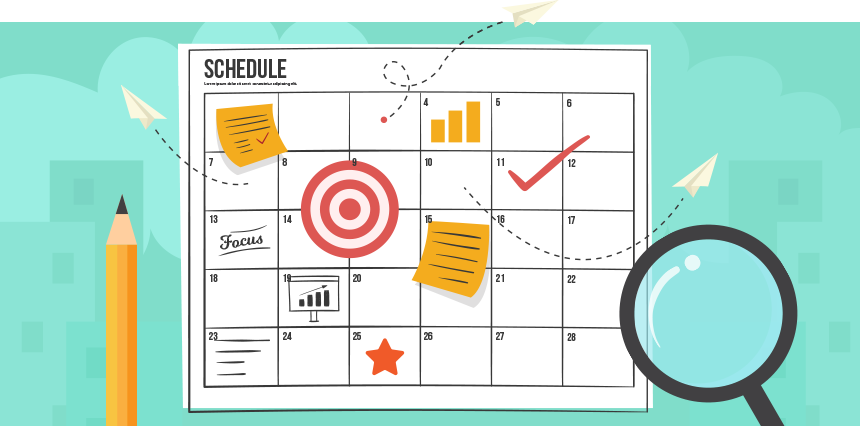
Click the button to start reading
How To Create A Weekly Work Plan That Works For You
It can often seem like there just aren’t enough hours in a day. Schedules get overwhelmingly full and demands seem to grow in intensity, elevating stress levels. Without a weekly work plan, it’s easy for project deadlines or important meetings to slip through the cracks.
This is a cycle that’s not uncommon, however, it is one that comes with an easy fix (if implemented correctly). When you get in the habit of creating a weekly work plan, forgetting team meetings or finishing your tasks behind schedule will become a thing of the past.
Technology has given us a wide array of options to help plan our days and weeks, providing a variety of organizational tools to fit any work style and to help boost productivity while also encouraging efficiency in your daily routines.
What Is A Weekly Work Plan?
A weekly work plan is essentially a schedule for your week that’s created in a way that is tailored specifically to your individual work style. It incorporates the events for the whole week, clearly labelling each day’s tasks and each week’s end goal.
They can be created in a variety of ways but most often will come in the form of a calendar or a list, and can be either physical or electronic. Ultimately, how your weekly work plan looks will depend on what works best for you, and how you customize it to fit your needs.

What Are The Benefits Of Having A Weekly Work Plan?
Having a weekly work plan comes with a range of benefits that not only affect your working relationships, project quality, and daily stressors, but also the company’s success as a whole.
Stay Organized
By implementing a weekly work plan, you’re creating a workspace that is centered around organization. Staying organized at work is closely linked to increased productivity, workplace efficiency, and reduced rates of stress experienced throughout the work day.
Become a Better Team Player
Weekly work plans allow you to become a more dependable member of your team while working collaboratively. Not only will your assigned tasks be clearly laid out for you to understand and schedule around, but you’ll also be much less likely to forget meetings or important task completion dates, setting your whole team up for success (while establishing yourself as a leader).
Increased Productivity
Once you’ve successfully created a weekly work plan, each aspect of your week will be accounted for and scheduled appropriately, leading to a more productive use of your working hours. You’ll find yourself completing higher quality work in less time because you’ve effectively removed the wasted time previously spent guessing what you need to do next (since you’ve already accounted for it in your work plan for that week!).
Decreased Stress
Stress often stems from the unknown or from factors outside of your control, especially when it comes to your job and the effect it has on your life. By creating a work plan, you’ll remove those worries by creating a space that’s predictable and structured specifically for your work style, making each day easier to navigate. This will also allow you to manage the challenges and unforeseen changes that do come up much more efficiently because you’ll now have created an environment that allows for clearer viewpoints that aren’t clouded by stressors.

5 Ways To Create A Successful Weekly Work Plan
A weekly work plan reflects the work style of the person who creates it and therefore can look different for each person. For example, Jack Dorsey, the co-founder of Twitter has been known to divide his week in a way that assigns each day a theme, such as management and meetings on Mondays and marketing and growth on Wednesdays, while allotting himself recreation and hiking time on Saturdays.
While we encourage you to experiment with different styles, there are some steps you can take that will make the process of creating your work plan much easier (and more effective!)
1. Incorporate Both Weekly and Daily Goals
By incorporating goals into each week, you’re providing yourself with a way to measure your success, while also giving yourself something to work towards each week. It’s best not to set too many goals at once, but rather assign one or two goals that align with your expectations for that time period.
2. Schedule Everything
Meetings, calls, uninterrupted work time, breaks, and highly desirable activities must all be scheduled into your weekly work plan. Not only will this ensure you take breaks and have aspects of your day or week you can look forward to, but it also provides you with an easy way to navigate each day without worrying that you’ll miss something important (like that team meeting!). If you need to, start by breaking your days up by the hour and plan each one intentionally. This will help you get a feel for how your day can flow depending on the scheduled tasks and the time required for each.
3. Define Milestones for Larger Projects
Larger projects can be harder to plan for because they span out over longer timeframes. By setting key milestones and incorporating them into your weekly schedule, it will: keep you on track to complete the project on time, create a natural way for you to measure your progress, and review the efficiency of your work habits if you’re not able to meet those milestones.
4. Match Your Schedule to Your Work Style
Consider what times you work best throughout the day, and arrange your schedule in a way that works to your strengths during each hour. If you’re a morning person and find you have the most drive during the first half of your workday, schedule your most intensive tasks during that portion of the day and your easier ones in the afternoon when your energy levels deplete and you find it harder to focus or complete tasks in a reasonable time. If you’re someone who finds their energy peaks in the afternoon, simply switch this schedule to reflect that. When you schedule your daily tasks around your personal energy fluctuations, you’ll maximize your workflow for efficiency and productivity.
5. Be Realistic!
Only so much can fit into one day. Start timing yourself when completing more focused tasks and use that to help plan your week. Don’t try to overfill each day with tasks that will leave you with items being pushed into the next day. Assign tasks intentionally, considering the time it will take to complete them while also allotting time for breaks throughout your day.

How To Make Your Weekly Work Plan A Habit
Habits take time to develop, so it is essential to assign a time for you to create your weekly work plan each week. It needs to be intentional and reoccurring, while also taking into account the many factors that will influence it over time.
Schedule a time to create your plan each week
Preferably, create your weekly work plan each Sunday evening. By doing it at this time, you’re ensuring it won’t cut into your weekend plans and personal time, while also providing you a time to look at your week just before it begins and plan for it with more intention.
Schedule your weekends as well
When you add your weekends into your weekly work plan, it serves as a reminder throughout the week that you’ve provided yourself with downtime away from work, and naturally gives you something to look forward to as you progress through each day of the week.
Audit your calendars and previous work plans
Review how many items (if any) were left incomplete at the end of the previous week, as well as the tasks that were more difficult than expected or took more time to complete than you scheduled for. Use this to influence how you set up your plan for the next week. Each time you audit your previous work plans and reshape them to better fit your abilities, you’ll get closer to optimizing your workflow in a way that is most efficient for you, while also identifying those areas that could use improvement (and those that you thrive in).
A Weekly Work Plan Increases Productivity
In conclusion, by creating a weekly work plan that plays to your strengths and is formed with your personal work style in mind, you’ll be able to cultivate a work environment where you can thrive. The stress caused by a disorganized schedule can easily be replaced with high efficiency and increased productivity when a structured schedule has been implemented successfully. If you follow the steps above and create your individualized weekly work plan, you’ll begin to find success in the workplace by achieving both your goals and the goals of your team and company as well.
















